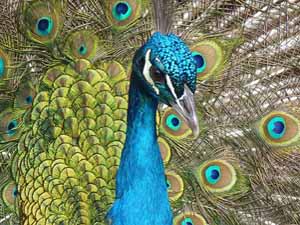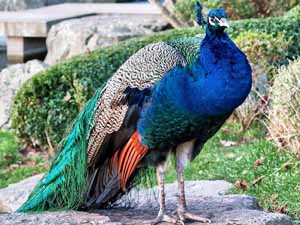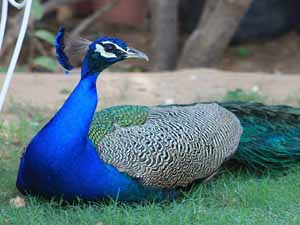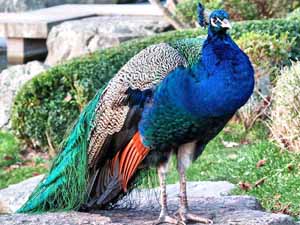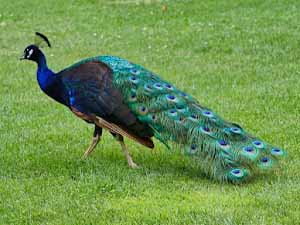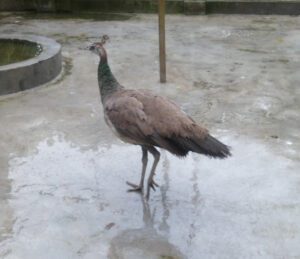Peacock feeding habits are quite interesting to observe. Peacocks are omnivores that eat a variety of foods, including seeds, fruits, insects, small mammals, and reptiles. They are opportunistic feeders that will eat whatever food is available to them, including agricultural crops and garbage. In captivity, they should be fed a balanced diet of grains, fruits, vegetables, and protein supplements, and their diet should be carefully monitored to ensure their health and wellbeing.
Peacocks are also known to be opportunistic feeders, which means that they will eat whatever food is available to them. They have been observed feeding on agricultural crops, such as corn and wheat, and scavenging in garbage dumps and around human settlements. In captivity, peacocks are usually fed a diet of grains, fruits, and vegetables. They may also be given protein supplements, such as insects or small amounts of meat, to ensure they receive all the necessary nutrients.
It’s important to note that feeding peacocks the wrong food can be harmful to their health. For example, feeding them a diet high in carbohydrates and low in protein can lead to obesity and other health problems. It’s best to consult with a veterinarian or avian specialist to ensure that you are providing the right kind and amount of food for your peacocks.
Peacock Feeding Habits
Peacocks are omnivores, which means that they eat both plant and animal matter. In the wild, peacocks feed on a variety of foods, including seeds, fruits, insects, small mammals, reptiles, and amphibians. One of the primary components of a peacock’s diet is seeds. They eat a variety of seeds, including those from grasses, flowers, and trees. They are also known to consume fruits, such as berries and figs, and will often climb trees to reach the fruit.
Peacocks are opportunistic feeders, which means that they will eat whatever food is available to them. They have been observed feeding on agricultural crops, such as corn and wheat, and scavenging in garbage dumps and around human settlements. In addition to plant matter, peacocks also consume animal matter. They will eat insects, such as grasshoppers and crickets, and small mammals like rodents and reptiles like lizards and snakes. They have even been known to catch and eat small birds.
When in captivity, peacocks are usually fed a diet of grains, fruits, and vegetables. They may also be given protein supplements, such as insects or small amounts of meat, to ensure they receive all the necessary nutrients. It’s important to provide a balanced and nutritious diet for peacocks in captivity to ensure their health and wellbeing.

What to Feed Peacocks
Peacock feeding can be a fun and rewarding experience, but it’s important to remember that not all foods are safe or healthy for them. Offering them a diet of fruits, vegetables, grains, insects, and nuts will provide them with the essential nutrients they need to stay healthy and happy.
You can also provide them with clean, freshwater to drink regularly. By being mindful of what you feed peacocks, you can help them live a long and healthy life.
Fruits
Fruits are an excellent source of vitamins, minerals, and antioxidants that are beneficial for peacocks. You can feed them a variety of fruits, including apples, bananas, berries, mangoes, and watermelon. Cut the fruits into small pieces, and offer them to the peacocks.
Vegetables
Peacocks also enjoy a variety of vegetables, such as carrots, peas, corn, spinach, and lettuce. Vegetables provide essential nutrients that help to keep the peacock’s immune system strong and healthy. You can offer the vegetables raw or lightly steamed.
Grains
Grains like wheat, oats, and barley are a good source of energy and protein for peacocks. You can offer them the grains dry or soaked in water to make them easier to digest.

Insects and small animals
Peacocks are omnivorous, and they will eat insects, worms, and small animals like mice and lizards. However, it’s important to avoid feeding them live insects as they can cause injuries to the peacock’s mouth and throat. Instead, you can offer them cooked insects like mealworms and crickets.
Nuts
Peacocks also enjoy nuts, including peanuts, almonds, and walnuts. Nuts are a good source of protein, fat, and fiber that help to keep the peacock’s feathers healthy and shiny. However, it’s important to feed them unsalted nuts to avoid causing health problems.
Freshwater
Peacocks also need to drink water regularly to stay hydrated. You can offer them fresh, clean water in a shallow dish or fountain.
What Not to Feed Peacocks
Feeding peacocks with the wrong types of food can cause serious harm to their health and well-being. Here are some foods that you should avoid feeding peacocks:
Bread
Bread is one of the most common foods that people offer to birds, including peacocks. However, feeding bread to peacocks can be harmful to their health as it does not contain any essential nutrients and can cause digestive problems in birds. Feeding bread to peacocks can also lead to overfeeding and obesity.
Processed foods
Peacocks are omnivorous and will eat almost anything that they come across. However, processed foods such as chips, sweets, and fast food are not a good option as they lack essential nutrients and can lead to obesity and other health issues.
Salty foods
Peacocks should not be fed with salty foods as they can cause dehydration and health problems. Foods like chips, pretzels, and popcorn contain high levels of salt, which can lead to serious health issues in peacocks.
Avocado
Avocado is a popular food among humans, but it’s toxic to many animals, including peacocks. Avocado contains a toxin called persin, which can cause digestive problems, heart damage, and even death in birds.
Chocolate
Chocolate is another food that should never be fed to peacocks. Chocolate contains a compound called theobromine, which is toxic to birds and can cause vomiting, diarrhea, seizures, and even death.
Alcohol
Alcohol is harmful to peacocks, just as it is to humans. Even small amounts of alcohol can cause serious health issues, including liver and kidney damage, in birds.
Coffee and tea
Coffee and tea contain caffeine, which is harmful to birds. Caffeine can cause heart palpitations, hyperactivity, and even death in birds.

